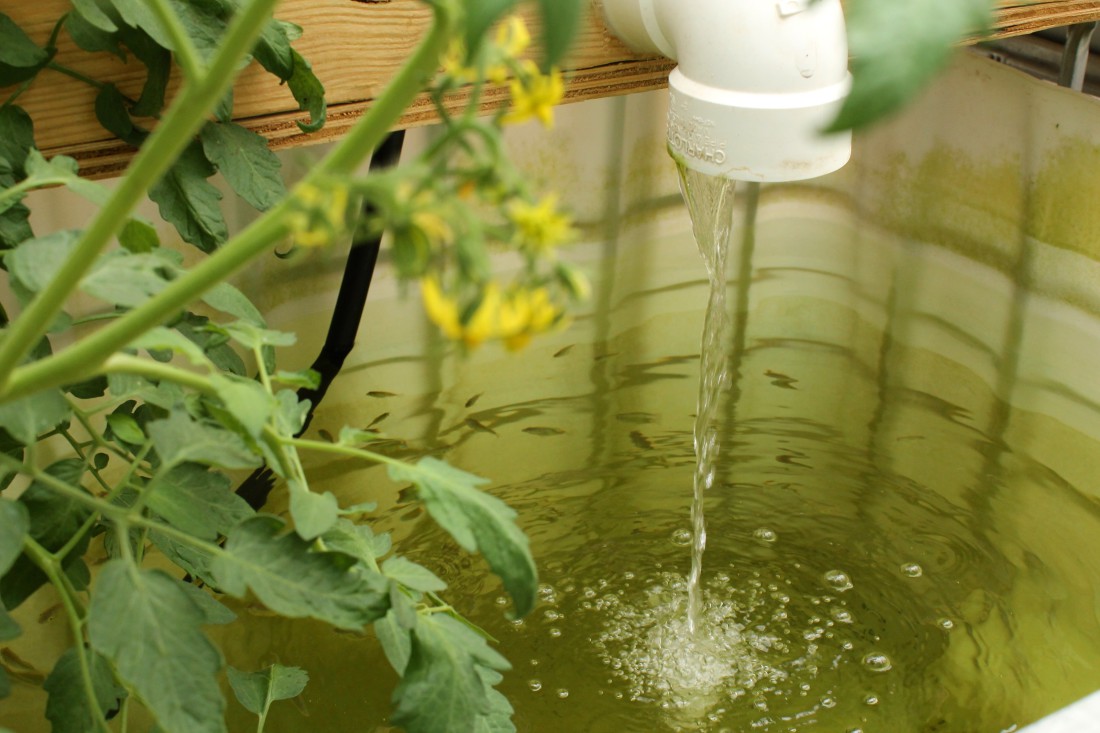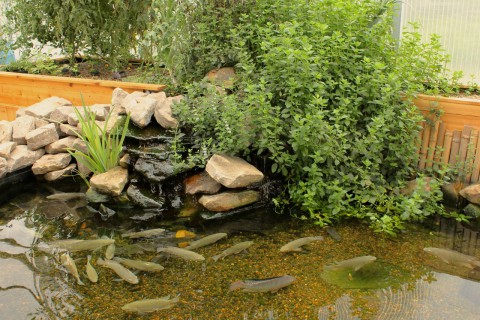The current aerates the water. The water spawns the algae. The algae feed the fish. The fish fertilize the plants. The water flows between them all.
It’s a cycle known as aquaponics, which uses dual-tanked plant-and-fish habitats to create a symbiotic environment and a sustainable system that mimics the natural world. One tank holds the fish; the other, the plants. A pump flows water between the two, aerating the water in the process. Along with hydroponics — a similar idea that focuses solely on raising vegetation — it’s creating an alternative to traditional in-soil farming.
Anthony Coggiola, CEO of Asheville Urban Farms, says some people initially think aqua- and hydroponic gardens are unnatural or bizarre. “A lot of people think hydroponics is somewhat Frankenstein-ish,” he says. “That’s not true. ‘Hydro’ means water; ponics, comes from ‘pono’ meaning work — so you’re letting the water do the work for you.”
In hydroponics and aquaponics, plants gather nourishment from nutrients flowing in the water — without the use of soil. Products such as Grodans, grow plugs or cocoa husks can be used as synthetic soil to hold down seeds and the roots of young plants as they grow. But don’t confuse that with “drowning the plants,” Coggiola says.
“The roots are suspended, and the water is moving so the roots just go crazy and wild,” he explains. “They’re not fighting the soil for water, and you’re creating an ideal condition for the plants.”
So ideal, in fact, that Coggiola says hydroponic growers can yield up to 13 harvests per year, compared with the average 3.5 of a soil garden, in part because a hydro- or aquaponic system can be harvested year-round when contained in a controlled climate environment such as a greenhouse or indoor space.
Cliff Jagger, owner of Asheville Aquaponics, notes that an aquaponics system is self-sustaining. “It’s like a mini-ecosystem,” he says. “The fish do all the work — they eat the algae, and their poop fertilizes the plants.”
And in an age of pesticides, herbicides and other pollutants, aquaponics can bring a certain comfort, Jagger adds. “You know where your food is coming from, and you know your fish aren’t swimming around in toxic wastewater,” he says, adding that in order for the system to work, it has to be closed off from outside elements. “We feed them certified organic fish food, so even their poop is organic. Everything grows four times faster, and you can do it all year long.”
Though the system seems complex, Jagger says the concept has been around for tens of thousands of years, dating back to techniques used by Chinese and Egyptian cultures 10,000 years ago. Only recently did advances in water technology make the systems more practical and popular. A more modern, simple system makes use of an electric pump, Jagger says, and costs around $4 per month in electricity to run. The pump keeps the water in the tanks circulating so that the fishes’ waste will settle into a rock bed, which acts as the system’s natural biofilter.
A simple aquaponics system can cost around $350, Jagger says, though he adds that some may choose to opt for something more complicated, which he deems unnecessary. He estimates the total cost rising to around $450-$500 once the fish and stones are purchased.
“But it’s a one-time deal,” he notes, “unless you start adding on and increasing your size. The idea is to have a self-sustainable system. The more gadgets you add to it, the more problems you’ll have. Why not just do it simple, cheap and easy?”
Coggiola says many of the products needed for the systems are available locally at independent retailers, including New Age and Fifth Season. Asheville Aquaponics also sells systems and gear for aspiring urban aqua-farmers. The method is gaining popularity with homesteaders and schools. Jagger says he has sold aquaponic systems to local schools, including Odyssey Community School in Asheville — and he has presented guest lectures to the students on using aquaponics for alternative farming techniques and food-origin awareness.
But don’t expect to see aquaponically harvested fish in Asheville restaurants anytime soon. Coggiola says there are aquaponic farms and restaurants in Kentucky that grow and serve their own fish, but Jagger notes that in order to operate a business like that, “you really need a lot of fish,” which can be difficult without a much larger system. Jagger adds that while he is licensed to sell to restaurants, Asheville Aquaponics is primarily for personal or educational systems.
Both Coggiola and Jagger agree that interest in hyrdro- and aquaponics is increasing throughout the country. “America is famous for innovation,” Coggiola says. “There’s a lot of cool innovations that have come out of this country. We can be a leader in this type of agriculture.”




Before you comment
The comments section is here to provide a platform for civil dialogue on the issues we face together as a local community. Xpress is committed to offering this platform for all voices, but when the tone of the discussion gets nasty or strays off topic, we believe many people choose not to participate. Xpress editors are determined to moderate comments to ensure a constructive interchange is maintained. All comments judged not to be in keeping with the spirit of civil discourse will be removed and repeat violators will be banned. See here for our terms of service. Thank you for being part of this effort to promote respectful discussion.